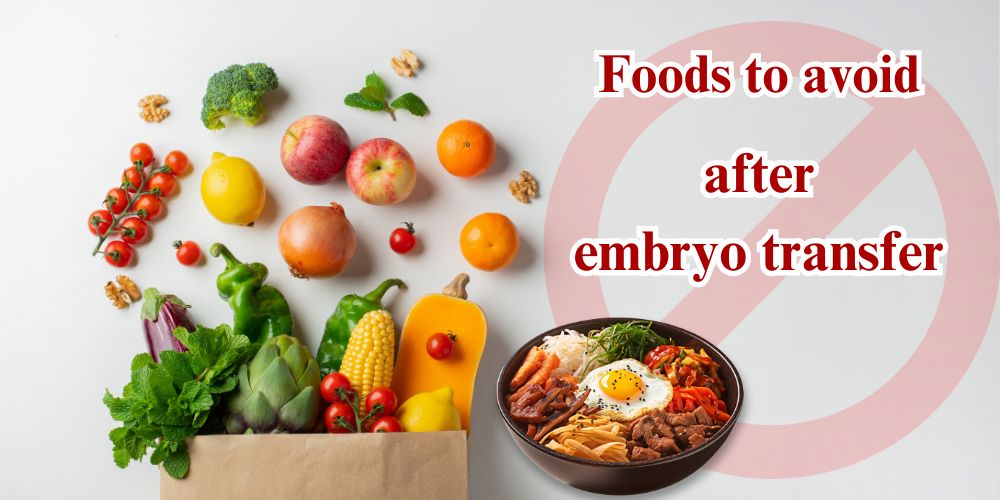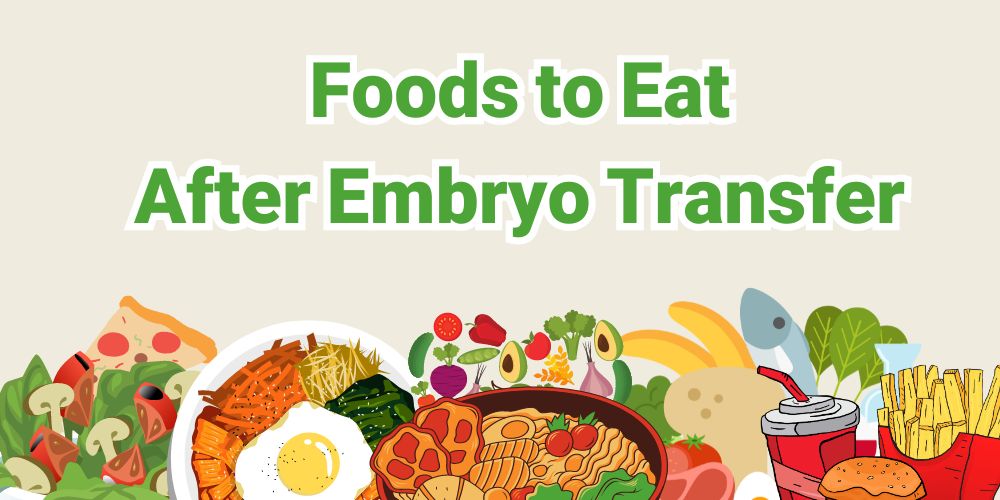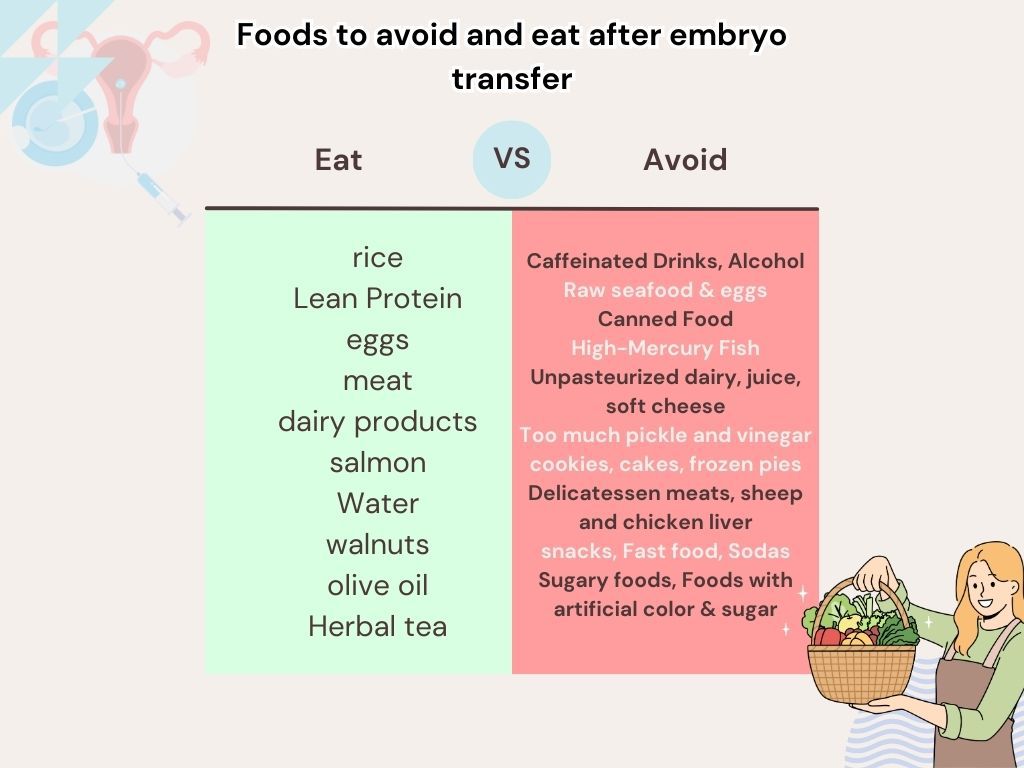
Eating enough, consuming the right foods, and avoiding certain foods are factors that many people often overlook. However, following these principles is essential to improve both the health of the mother and the chances of a successful IVF process. The post-IVF diet plays a crucial role in achieving a successful embryo transfer and IVF journey.
Infertility treatment clinics with high success rates (like TebMedTourism in Iran) place great importance on the mother’s nutrition before and after embryo transfer. In some cases, they even recommend consultations with nutritionists.
In this section, we will explore some key foods to include in your post-embryo transfer diet:
Protein is essential for the growth and development of the baby. Include the following protein-rich foods in your diet:
It’s important to consume red meat and eggs in moderation.
Iron plays a crucial role in hemoglobin synthesis, which ensures proper oxygenation and function of all body tissues, including the reproductive system. A deficiency in iron can lead to anemia, which is more common in women. To maintain healthy iron levels, include the following foods:
Zinc is vital for hormone balance, especially for women’s reproductive health. To ensure sufficient zinc intake, consider adding these foods to your diet:
If needed, consult a fertility expert for zinc supplements.
Folic acid is essential for the normal development of the baby’s brain and spinal cord. It helps prevent neural tube defects. Incorporate folic acid-rich foods, such as:
Healthy fats are crucial during the IVF journey as they provide energy. Polyunsaturated fatty acids can improve fertility and embryo quality, while trans fats can negatively impact fertility. To support your health, opt for healthy fat sources, including:
Avoid trans-fat-rich foods, such as cookies, cakes, and fast food, as they can affect pregnancy.

| Fruits | |
| Eat | Avoid |
| Banana | Pineapple |
| Pineapple | Papaya |
| citrus fruits | Dates |
| Apple | |
| Coconut | |
| Watermelon | |
| Vegetable | |
| Eat | |
| pumpkin seeds | |
| spinach | |
| beetroot | |
| carrot | |
| Grain | |
| nuts | |
| broccoli | |
| asparagus | |
| Beans | |
| peas | |
| Avocados | |
| Chia seeds | |
| Garlic | |
| Cucumber | |
The period following an embryo transfer is crucial for potential implantation and pregnancy. While there's limited scientific evidence directly linking diet to implantation success, many believe that consuming warm foods can help create a more receptive environment in the uterus. Below is a list of warm foods commonly recommended during this time to support your body:
Soups and broths are both warming and nutrient-rich. Homemade versions, especially those made from vegetables, chicken, or bone, are particularly beneficial. These foods are easy to digest, which is essential during this time when the body needs optimal conditions for potential implantation. Broths made from scratch are rich in collagen, minerals, and vitamins. Including a variety of vegetables can enhance the nutrient profile, and the warmth from the soup provides a comforting feeling, ensuring the body remains cozy.
Starting your day with a bowl of warm porridge can be an excellent choice after an embryo transfer. Oats or rice porridge provide slow-releasing carbohydrates for sustained energy throughout the morning. To boost its nutritional value, consider adding a mix of nuts like almonds and walnuts, seeds like chia or flax, and fruits like berries or bananas. This not only enhances the flavor but also provides a variety of textures and nutrients.
Steaming vegetables is one of the best ways to preserve their nutrients. Opt for easily digestible vegetables like carrots, zucchini, and spinach. Steamed vegetables are gentle on the digestive system and also provide warmth. Combining different vegetables gives you a range of essential vitamins and minerals that are crucial during this period.
Including lean proteins such as chicken, turkey, and fish in your diet is important for tissue repair and growth. Opt for healthier cooking methods like baking or grilling to retain the nutritional value of these proteins. It's also essential to source high-quality, preferably organic, proteins to avoid unwanted additives or hormones.
Eggs are a fantastic source of high-quality protein, containing all the essential amino acids. They are also rich in choline, which is vital for brain health. Whether scrambled, boiled, or made into an omelet with vegetables, eggs can be a nutritious and versatile addition to your post-transfer diet.
Whole grains such as quinoa, brown rice, and whole-grain pasta are nutrient-dense and provide sustained energy. They are rich in dietary fiber, which aids digestion and helps maintain a feeling of fullness. These grains also offer essential nutrients like B vitamins, iron, magnesium, and selenium.
Both ginger and turmeric are known for their anti-inflammatory properties. Consuming them as a warm tea can soothe the digestive system. Turmeric contains curcumin, which has antioxidant properties, while ginger aids in digestion and helps reduce nausea. This warming tea can be a comforting and health-boosting drink during this time.
Pumpkin and sweet potatoes are not only warming but also packed with nutrients. They are rich in beta-carotene, which the body converts into vitamin A, crucial for vision and immune function. These vegetables are also excellent sources of dietary fiber, vitamins C and E, and potassium. Their natural sweetness makes them suitable for both savory and sweet dishes.
Nuts and seeds are nutritionally dense and provide a combination of proteins, healthy fats, vitamins, and minerals. For example, almonds are rich in vitamin E, while walnuts contain omega-3 fatty acids. Seeds like flaxseeds and chia seeds are also powerhouses of nutrients. These can be added to salads, porridges, or enjoyed as snacks.
A warm glass of milk is soothing and provides essential calcium and vitamin D. For those who are lactose intolerant or prefer plant-based alternatives, almond milk or other nut milks are great options. They can be fortified with additional vitamins and often contain fewer calories.
Proper hydration is key to overall health. While it's advisable to limit cold drinks, it's essential to consume room-temperature or warm beverages. Herbal teas, warm water with a slice of lemon, or plain room-temperature water can help keep you hydrated. Hydration supports digestion, nutrient absorption, and maintaining body temperature.
During this crucial period, it's recommended to avoid excessively cold foods and drinks. Cold items like ice cream, cold salads, or chilled beverages might not be conducive to the body's need for warmth. Instead, opt for foods and drinks that are at room temperature or warm to ensure the optimal conditions for implantation.
In conclusion, maintaining a balanced diet is crucial for the success of your embryo transfer and IVF journey. One of the key factors in optimizing the chances of a successful implantation is knowing which foods to avoid. Foods to avoid after embryo transfer, such as alcohol, caffeine, high-mercury seafood, processed foods, and sugary snacks, can negatively impact hormonal balance and embryo health. By avoiding these harmful foods and focusing on a nutritious, well-balanced diet, including protein-rich foods, healthy fats, and antioxidant-rich fruits and vegetables, you can create a more favorable environment for implantation. Prioritizing these dietary adjustments can significantly contribute to the success of your IVF process and overall well-being during this crucial time.

Comments & Questions